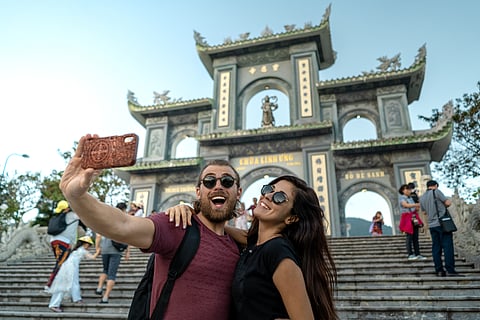
- Destinations
- Experiences
- Stay
- What's new
- Editor’s Picks
- Responsible Tourism
- CampaignsCampaigns
- Subscribe

Vietnam is a beautiful country with a rich cultural heritage, stunning landscapes, and a vibrant street food scene. For travellers, it offers an array of experiences, from exploring bustling cities like Hanoi and Ho Chi Minh City to relaxing on the pristine beaches of Phu Quoc. While the majority of your time in Vietnam is sure to be filled with memorable moments, it's essential to be aware of potential scams that could tarnish your experience. Here's how to spot and avoid scams while travelling in Vietnam.
To avoid falling victim to scooter snatching, it's important to take a few precautions. For instance, you should consider using a bag with a clasp or a sturdy strap and loop it through your table leg or bike handle when sitting at a café or riding a bike. Also, try to avoid sitting or walking too close to the road. Additionally, keep your phone and wallet in your front pocket or inside your bag to make it more difficult for potential thieves to snatch them.
Vietnam is known for its leather products, especially in Hoi An and Saigon. However, some shops may try to sell you fake leather items that are made of plastic or low-quality materials. To avoid this, check the item carefully before buying, and look for signs of stitching, smell, texture, and colour. If you suspect it’s fake, you can test it by heating a metal piece with a lighter and holding it to the plastic part, which will melt. Then, demand a refund or a replacement.
If you're ever told that the cheaper seats for a show or attraction are sold out, don't give up just yet. Always ask the ticket seller to double-check the availability of the cheaper seats, and if you're still unsure, consider asking a local for help or buying your tickets online from official websites. This way, you can avoid buying a more expensive ticket and save some money in the process.
Have you ever been in a situation where you were quoted a price in a foreign currency, and it left you feeling confused and misled? Well, that's exactly what can happen when you're in Vietnam, and someone quotes you a price in US dollars instead of Vietnamese Dong. To make matters worse, sometimes the price is abbreviated as 10, which can mean 10 dollars or even 10,000 dong (about 0.43 USD).
But don't worry, there's a simple solution to avoid any confusion and ensure that you're getting a fair deal. Always ask for the price in dong and confirm the amount before paying. It's also a good idea to use small bills and coins to avoid getting incorrect change or counterfeit money.
This can happen whether you buy your own motorbike, rent one from a shop, or take a motorbike taxi. To avoid this, always inspect the motorbike before renting or buying it, take photos of any existing damage, lock it when not in use, wear a helmet, and drive carefully. Also, only use reputable motorbike rental shops or taxi services such as Grab or Gojek.
In Vietnam, you might be approached by a friendly vendor who offers you a fruit basket or a coconut to try for free. However, once you accept it, they will demand an exorbitant price or ask you to pay for their services, such as taking photos or carrying your bags. To avoid this, politely decline any offers from street vendors or hawkers who approach you unsolicitedly. If you want to buy something from them, agree on the price beforehand and pay only after receiving the item.
This is when you find a copycat version of a popular restaurant, hotel, or tour agency that uses a similar name or logo to trick you into thinking that it’s the original one. However, once you enter it, you will find that the quality of the service or product is much lower than expected or that they charge you more than advertised. To avoid this, compare the name and location of the business with online reviews or guidebooks before entering it. Also, look for signs of authenticity, such as certificates, awards, or ratings.
While travelling in Vietnam, it's important to be cautious when using taxi services. The two most reputable companies are Vinasun, identified by their white cars, and Mai Linh, with green cars. Although some other companies may use the same colour scheme, their drivers may not be as honest. When taking a taxi, always check for a meter and be aware if the fare seems to be climbing too quickly. Additionally, be mindful when paying the fare, as some drivers may attempt to switch out your money.
This might happen when you take a cyclo ride (a bicycle rickshaw) and encounter problems such as overcharging, taking longer routes, or stopping at unwanted places. This can happen whether you agree on the price beforehand or use the meter. To avoid this, only use cyclos for short distances and negotiate the price before getting on. Also, use a map or GPS to track your route and destination and don’t let the driver take you to any shops or attractions that you don’t want to visit.
This can happen whether you order from a menu or not. To avoid this, always check the prices and the items on your bill before paying. Also, avoid restaurants or bars that have no menu or prices displayed or that have touts or promoters outside. Instead, look for places that have good reviews or recommendations from other travellers or locals.
